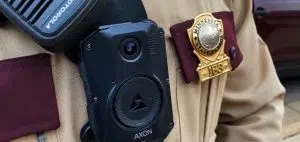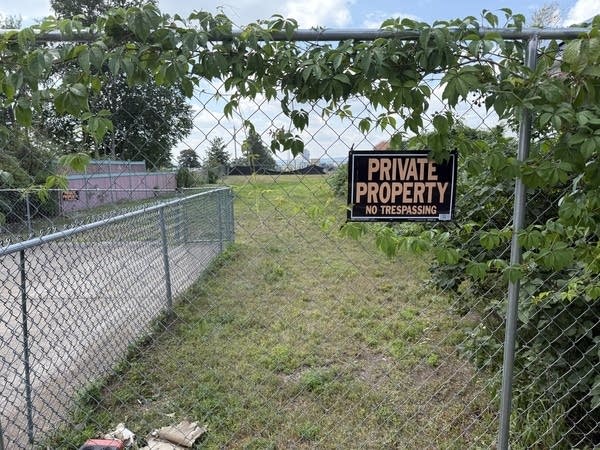 DETROIT LAKES (KDLM) – The Detroit Lakes Police Department has budgeted to implement body-worn cameras this year.
DETROIT LAKES (KDLM) – The Detroit Lakes Police Department has budgeted to implement body-worn cameras this year.
Detroit Lakes residents will have an opportunity to give public comments for the Department’s body camera policy, Tuesday at the Detroit Lakes City Council meeting at 5 p.m.
The policy addresses when cameras are to be activated or switched off, procedures for the storage of video files as well as a number of other things. A copy of the policy is below or available to download here.
| Policy 419 |
Detroit Lakes Police Department
Detroit Lakes PD Policy Manual
Portable Audio/Video Recorders
419.1 PURPOSE AND SCOPE
This policy provides guidelines for the use of portable audio/video recording devices by members of this department while in the performance of their duties (Minn. Stat. § 626.8473). Portable audio/ video recording devices include all recording systems whether body-worn, handheld or integrated into portable equipment.
This policy does not apply to mobile audio/video recordings, interviews or interrogations conducted at any Detroit Lakes Police Department facility, undercover operations, wiretaps or eavesdropping (concealed listening devices) unless captured by a portable recording system.
419.1.1 DEFINITIONS
Definitions related to this policy include:
Portable recording system – A device worn by a member that is capable of both video and audio recording of the member’s activities and interactions with others or collecting digital multimedia evidence as part of an investigation and as provided in Minn. Stat. § 13.825.
419.2 POLICY
The Detroit Lakes Police Department may provide members with access to portable recorders for use during the performance of their duties. The use of recorders is intended to enhance the mission of the Department by accurately capturing contacts between members of the Department and the public.
419.3 MEMBER PRIVACY EXPECTATION
All recordings made by members on any department-issued device at any time or while acting in an official capacity of this department, regardless of ownership of the device, shall remain the property of the Department. Members shall have no expectation of privacy or ownership interest in the content of these recordings.
419.4 MEMBER RESPONSIBILITIES
Prior to going into service, each uniformed member will be responsible for making sure that he/ she is equipped with a portable recorder issued by the Department, and that the recorder is in good working order (Minn. Stat. § 13.825). If the recorder is not in working order or the member becomes aware of a malfunction at any time, the member shall promptly report the failure to his/her supervisor and obtain a functioning device as soon as reasonably practicable. Uniformed members should wear the recorder in a conspicuous manner or otherwise notify persons that they are being recorded, whenever reasonably practicable (Minn. Stat. § 626.8473).
Any member assigned to a non-uniformed position may carry an approved portable recorder at any time the member believes that such a device may be useful. Unless conducting a lawful recording in an authorized undercover capacity, non-uniformed members should wear the recorder in a conspicuous manner when in use or otherwise notify persons that they are being recorded, whenever reasonably practicable.
When using a portable recorder, the assigned member shall record his/her name, employee number and the current date and time at the beginning and the end of the shift or other period of use, regardless of whether any activity was recorded. This procedure is not required when the recording device and related software captures the user’s unique identification and the date and time of each recording.
Members should document the existence of a recording in any report or other official record of the contact, including any instance where the recorder malfunctioned or the member deactivated the recording (Minn. Stat. § 626.8473). Members should include the reason for deactivation.
419.5 ACTIVATION OF THE AUDIO/VIDEO RECORDER
This policy is not intended to describe every possible situation in which the recorder should be used, although there are many situations where its use is appropriate. Members should activate the recorder any time the member believes it would be appropriate or valuable to record an incident.
The recorder should be activated in any of the following situations:
- All enforcement and investigative contacts including stops and field interview (FI) situations
- Traffic stops including, but not limited to, traffic violations, stranded motorist assistance and all crime interdiction stops
- Self-initiated activity in which a member would normally notify Dispatch
- Any other contact that becomes adversarial after the initial contact in a situation that would not otherwise require recording
Members should remain sensitive to the dignity of all individuals being recorded and exercise sound discretion to respect privacy by discontinuing recording whenever it reasonably appears to the member that such privacy may outweigh any legitimate law enforcement interest in recording. Requests by members of the public to stop recording should be considered using this same criterion. Recording should resume when privacy is no longer at issue unless the circumstances no longer fit the criteria for recording.
At no time is a member expected to jeopardize his/her safety in order to activate a portable recorder or change the recording media. However, the recorder should be activated in situations described above as soon as reasonably practicable.
419.5.1 CESSATION OF RECORDING
Once activated, the portable recorder should remain on continuously until the member reasonably believes that his/her direct participation in the incident is complete or the situation no longer fits the criteria for activation. Recording may be stopped during significant periods of inactivity such as report writing or other breaks from direct participation in the incident.
419.5.2 SURREPTITIOUS RECORDINGS
Minnesota law permits an individual to surreptitiously record any conversation in which one party to the conversation has given his/her permission (Minn. Stat. § 626A.02).
Members of the Department may surreptitiously record any conversation during the course of a criminal investigation in which the member reasonably believes that such a recording will be lawful and beneficial to the investigation.
Members shall not surreptitiously record another department member without a court order unless lawfully authorized by the Chief of Police or the authorized designee.
419.5.3 EXPLOSIVE DEVICE
Many portable recorders, including body-worn cameras and audio/video transmitters, emit radio waves that could trigger an explosive device. Therefore, these devices should not be used where an explosive device may be present.
419.6 IDENTIFICATION AND PRESERVATION OF RECORDINGS
To assist with identifying and preserving data and recordings, members should download, tag or mark the recordings in accordance with procedure and document the existence of the recording in any related case report.
A member should transfer, tag or mark recordings when the member reasonably believes:
- The recording contains evidence relevant to potential criminal, civil or administrative matters.
- A complainant, victim or witness has requested non-disclosure.
- A complainant, victim or witness has not requested non-disclosure but the disclosure of the recording may endanger the person.
- Disclosure may be an unreasonable violation of someone’s privacy.
- Medical or mental health information is contained.
- Disclosure may compromise an under-cover officer or confidential informant.
- The recording or portions of the recording may be protected under the Minnesota Data Practices Act.
Any time a member reasonably believes a recorded contact may be beneficial in a non-criminal matter (e.g., a hostile contact), the member should promptly notify a supervisor of the existence of the recording.
419.6.1 RETENTION REQUIREMENTS
All recordings shall be retained for a period consistent with the requirements of the organization’s records retention schedule but in no event for a period less than 180 days.
419.7 REVIEW OF RECORDED MEDIA FILES
When preparing written reports, members should review their recordings as a resource (See the Officer-Involved Shootings and Deaths Policy for guidance in those cases). However, members shall not retain personal copies of recordings. Members should not use the fact that a recording was made as a reason to write a less detailed report.
Supervisors are authorized to review relevant recordings any time they are investigating alleged misconduct or reports of meritorious conduct or whenever such recordings would be beneficial in reviewing the member’s performance.
Recorded files may also be reviewed:
- Upon approval by a supervisor, by any member of the Department who is participating in an official investigation, such as a personnel complaint, administrative investigation or criminal investigation.
- Pursuant to lawful process or by court personnel who are otherwise authorized to review evidence in a related case.
- In compliance with the Minnesota Data Practices Act request, if permitted or required by the Act, including pursuant to Minn. Stat. § 13.82, Subd. 15, and in accordance with the Records Maintenance and Release Policy.
All recordings should be reviewed by the Custodian of Records prior to public release (See the Records Maintenance and Release Policy). Recordings that are clearly offensive to common sensibilities should not be publicly released unless disclosure is required by law or order of the court (Minn. Stat. § 13.82, Subd. 7; Minn. Stat. § 13.825, Subd. 2).
419.8 COORDINATOR
The Chief of Police or the authorized designee should designate a coordinator responsible for (Minn. Stat. § 626.8473; Minn. Stat. § 13.825):
- Establishing procedures for the security, storage and maintenance of data and recordings.
- The coordinator should work with the Custodian of Records and the member assigned to coordinate the use, access and release of protected information to ensure that procedures comply with requirements of the Minnesota Government Data Practices Act (MGDPA) and other applicable laws (Minn. Stat. § 13.01 et seq.) (See the Protected Information and the Records Maintenance and Release policies).
- Establishing procedures for accessing data and recordings.
- These procedures should include the process to obtain written authorization for access to non-public data by DLPD members and members of other governmental entities and agencies.
- Establishing procedures for logging or auditing access.
- Establishing procedures for transferring, downloading, tagging or marking events.
- Establishing an inventory of portable recorders including:
- Total number of devices owned or maintained by the Detroit Lakes Police Department.
- Daily record of the total number deployed and used by members and, if applicable, the precinct or district in which the devices were used.
- Total amount of recorded audio and video data collected by the devices and maintained by the Detroit Lakes Police Department.
- Preparing the biennial audit required by Minn. Stat. § 13.825, Subd. 9.
- Notifying the Bureau of Criminal Apprehension (BCA) in a timely manner when new equipment is obtained by the Detroit Lakes Police Department that expands the type or scope of surveillance capabilities of the department’s portable recorders.
419.9 PROHIBITED USE OF AUDIO/VIDEO RECORDERS
Members are prohibited from using department-issued portable recorders and recording media for personal use and are prohibited from making personal copies of recordings created while onduty or while acting in their official capacity.
Members are also prohibited from retaining recordings of activities or information obtained while on-duty, whether the recording was created with department-issued or personally owned recorders. Members shall not duplicate or distribute such recordings, except for authorized legitimate department business purposes. All such recordings shall be retained at the Department.
Members are prohibited from using personally owned recording devices while on-duty without the express consent of the Shift Sergeant. Any member who uses a personally owned recorder for department-related activities shall comply with the provisions of this policy, including retention and release requirements and should notify the on-duty supervisor of such use as soon as reasonably practicable.
Recordings shall not be used by any member for the purpose of embarrassment, harassment or ridicule.
419.10 RETENTION OF RECORDINGS
All recordings shall be retained for a period consistent with the requirements of the organization’s records retention schedule but in no event for a period less than 180 days.
If an individual captured in a recording submits a written request, the recording may be retained for additional time period. The coordinator should be responsible for notifying the individual prior to destruction of the recording (Minn. Stat. § 13.825).
419.10.1 RELEASE OF AUDIO/VIDEO RECORDINGS
Requests for the release of audio/video recordings shall be processed in accordance with the Records Maintenance and Release Policy.
419.10.2 ACCESS TO RECORDINGS
Except as provided by Minn. Stat. § 13.825, Subd. 2, audio/video recordings are considered private or nonpublic data.
Any person captured in a recording may have access to the recording. If the individual requests a copy of the recording and does not have the consent of other non-law enforcement individuals captured on the recording, the identity of those individuals must be blurred or obscured sufficiently to render the subject unidentifiable prior to release. The identity of on-duty peace officers may not be obscured unless their identity is protected under Minn. Stat. § 13.82, Subd. 17.
419.11 ACCOUNTABILITY
Any member who accesses or releases recordings without authorization may be subject to discipline (See the Standards of Conduct and the Protected Information policies) (Minn. Stat. § 626.8473).

Latest News



